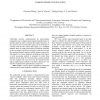Free Online Productivity Tools
i2Speak
i2Symbol
i2OCR
iTex2Img
iWeb2Print
iWeb2Shot
i2Type
iPdf2Split
iPdf2Merge
i2Bopomofo
i2Arabic
i2Style
i2Image
i2PDF
iLatex2Rtf
Sci2ools
82
Voted
ICASSP
2011
IEEE
2011
IEEE
A novel probe processing method for underwater communication by passive-phase conjugation
Underwater acoustic communication by passive-phase conjugation uses a channel probe signal transmitted prior to the data signal in order to estimate the channel response. At the receiver, the received probe signal can be truncated to correlate with the late arrived data signal. In a multipath channel, there are paths that undergo incoherent scattering by the sea surface, and they decrease the coherence between the estimated channel response and the channel response for data signal. For a linear frequency modulation probe signal, a novel processing method is proposed to select time delayed arrivals from the received probe, and this method can also suppress the noise level for the truncated probe signal. Applying this method to the data collected in a sea trial, the communication performance is improved.
| Added | 21 Aug 2011 |
| Updated | 21 Aug 2011 |
| Type | Journal |
| Year | 2011 |
| Where | ICASSP |
| Authors | Guosong Zhang, Jens M. Hovem, Hefeng Dong, Paul A. van Walree |
Comments (0)

